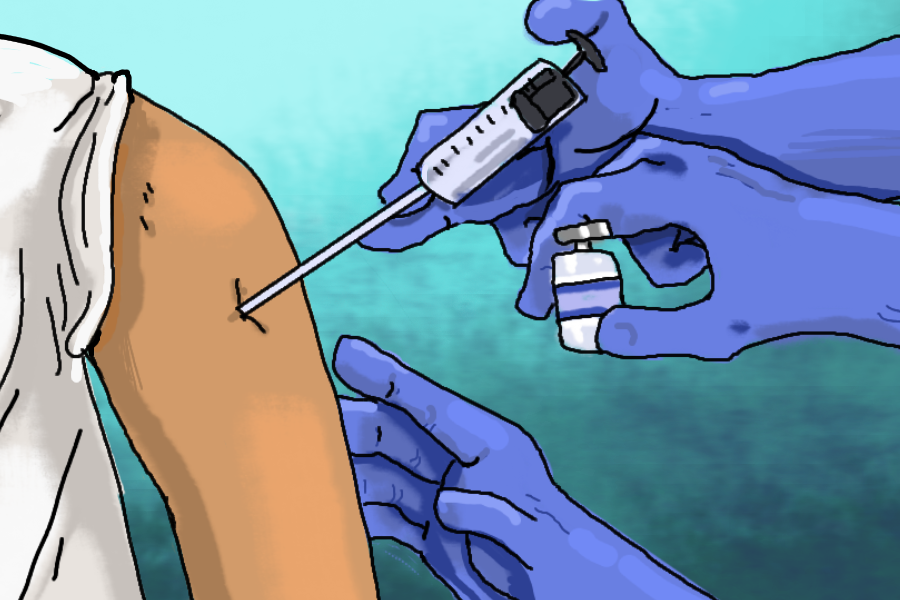CDPH talks COVID-19 falling vaccination rates in light of expanded eligibility, relaxed guidelines
Daily File Illustration by Hank Yang
People who are vaccinated at a Cook County Health site Wednesday will receive a Six Flags ticket in return, while supplies last.
May 17, 2021
As COVID-19 vaccine eligibility expands to 12- to 15-year olds and vaccination rates fall, Chicago Department of Public Health Commissioner Allison Arwady discussed Chicago’s obstacles and initiatives to vaccinate the remaining population at a press conference Wednesday.
Currently, Illinois has entered a “bridge phase” as the state looks to reopen entirely in the coming months. In Chicago, Mayor Lori Lightfoot anticipated a full reopening by July 4.
On misinformation and immunity
Arwady said one of the primary reasons remaining residents are not getting vaccinated is that they don’t believe they’re at risk for COVID-19.
Some residents who contracted COVID-19 are also refusing to get the vaccine, Arwady said, and are relying on natural immunity for protection against future infection. She said there are some false claims surrounding vaccine side effects, which are rooted in misinformation circulating online.
Arwady said there isn’t a “magic number” of vaccinated individuals needed nationwide to achieve herd immunity, especially in the presence of emerging variants.
While she predicts there will be geographic areas or social networks with high vaccination rates, mitigating spread if a positive case were to occur, for communities that are not as well protected, a single case can spread more aggressively. Similarly, Arwady said if vaccination rates don’t rise, Americans may see COVID-19 return.
Arwady: “I really want folks to understand, we’re still at a high risk level from COVID, and increasingly, that risk is falling on less vaccinated communities.”
On vaccination rates
Approximately 48 percent of Chicago residents have received at least one dose of the COVID-19 vaccine, according to the city’s data portal.
In the 18- to 29-year old group, 39 percent of Latinx and 15 percent of Black residents have received at least a first dose, compared to more than half of White and Asian Chicago residents in this group who have received at least a first dose, Arwady said.
Communities on the South Side, including in West Englewood, which have some of the lowest vaccination rates in the city, remain a major focus for the city, as they are also the neighborhoods with the highest death and hospitalization rates, according to Arwady.
Arwady: “We are very interested in thinking about ways to reach not just younger Chicagoans but younger Black and Latinx Chicagoans around increasing that confidence and really thinking about what (we can) do to help improve some of those vaccination rates.”
Supply for vaccines currently exceeds demand, with individuals who were eager to get vaccines already receiving or in the process of receiving them, and the potential for unused doses has now arisen. As a result, Arwady said the city is reducing the amount of mass vaccination sites it hosts.
Chicago also has a storage site for Pfizer-BioNTech that can store over 100,000 doses to reduce waste. Most don’t come in single-dose vials, however, which puts time constraints on the use of full vials before remaining doses must be discarded. To prevent 169 expiring doses from going to waste, Northwestern set up a midnight clinic to vaccinate students in April.
On university vaccine rollout
Arwady said many universities across the country have instituted mandatory vaccination for the fall. Some Chicago-area colleges, including Northwestern, Loyola University Chicago and DePaul University have followed suit.
Additionally, the Illinois Department of Public Health partnered with Illinois universities to help college students get vaccinated on College Vaccination Days at mass vaccination sites. The first one was held on April 17.
Arwady: “We have absolutely encouraged (universities) to become vaccine providers themselves, and then we send vaccine(s) to them just as we would for any other provider and we’ve seen good success with that.”
On Chicago’s vaccination initiatives
In an effort to combat misinformation and encourage vaccination, the city announced Tuesday its partnership with City Colleges of Chicago to launch the Vaccine Ambassador course. Aimed toward Chicago residents, the free two-hour online course serves to inform residents on the vaccine and how they can encourage others to get it.
Still, some people refuse vaccination due to distrust in the government. Arwady said the CDPH is addressing this by communicating that vaccines are available through trusted providers.
Arwady: “People are most motivated when their physician recommends a vaccine and about 85 percent of people say they trust that recommendation, but next is friends or family in terms of that recommendation.”
The city is also looking to stimulate demand for vaccines for unvaccinated individuals. One such initiative is the Protect Chicago Music series, which offers free tickets to music events in Chicago to individuals who are fully vaccinated.
To increase accessibility, Arwady said CDPH seeks to make vaccines as convenient as possible. The city is considering making vaccines available at commonly-visited places like laundromats, grocery stores, food pantries and faith-based organizations.
Email: amittal@u.northwestern.edu
Twitter: @amittal27
RELATED STORIES:
— City seeks community input on draft Post COVID-19 Action Plan
— The Daily’s COVID-19 vaccination guide: what you need to know and how to get a COVID-19 vaccine



